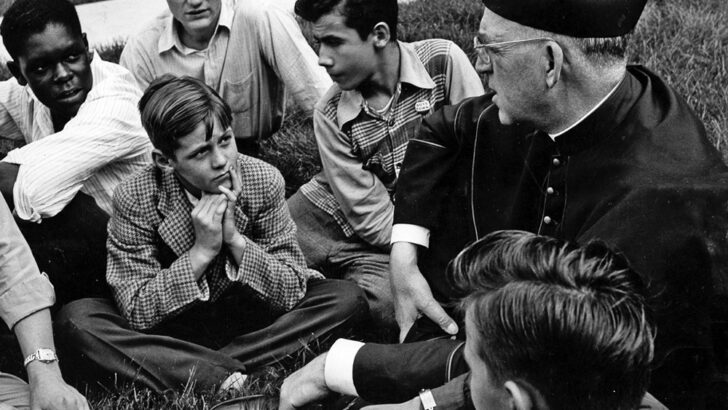Francesca Pollio Fenton
Many are familiar with the story of Fr Edward J. Flanagan from the 1938 Oscar-winning film ‘Boys Town’ starring Spencer Tracy. Now a new documentary on the famous priest promises a deeper look into Flanagan’s life when it hits cinemas for one night only on October 8.
‘Heart of a Servant: The Father Flanagan Story’ documents Flanagan’s unwavering commitment to caring for abandoned and orphaned youth starting from the Great Depression to after World War II, all while defying racist laws in order to serve the most vulnerable and give them hope for a future. The film covers a range of topics, from Flanagan’s health issues to his immigrating to the United States to his founding of Boys Town, Nebraska.
Documenting
The feature-length documentary was produced by Spirit Juice Studios in partnership with the Father Flanagan League and filmed on location in Ireland, Germany, Austria, Japan, and throughout the United States. It also includes expert commentary from Steve Wolf, vice postulator for the cause of Flanagan’s beatification and canonisation, as well as Deacon Omar FA Gutierrez, Fr Ryan Lewis, and Ed Flanagan, the great-nephew of Fr Flanagan, among others. The film is narrated by popular Catholic actor Jonathan Roumie, known for his role as Jesus Christ in ‘The Chosen’.
Rob Kaczmark, co-director and executive producer of the film, and producer Victoria McEachern spoke to CNA about their experience working on the project as well as how Flanagan has impacted them personally and what they hope viewers will take away from his inspiring story.
McEachern pointed out that while a lot of the bigger topics of Fr Flanagan’s life are very well known, it was the “smaller moments” that she learned while making the film that really stood out to her and gives the documentary more depth.
“For me it was those little, quiet moments,” she shared. “Fr Flanagan was this big personality who was incredibly well known and he was also a very quiet, holy, giving, generous man.”
To recognise how he stood on situations like that in the past really informs even now how we deal with injustices of our days”
She added that there’s also a lot we can continue to learn from Fr Flanagan – especially when it comes to injustices we face in society today.
“He was really ahead of his time in speaking out against issues of segregation and racial justice,” McEachern said. “To recognise how he stood on situations like that in the past really informs even now how we deal with injustices of our days.”
Kaczmark added that Fr Flanagan serves as a “strong example of calling people to be a saint” and hopes that viewers will be inspired to “recognise the problems in the things in their own life and where God’s calling them to serve and to lead people”.
Inspiration
McEachern hopes viewers will be inspired “by the example of one man”.
“There’s so much going on in the world and in our small communities as well. And so to see the difference – and he did, he made like really tangible impacts in a lot of different areas – to see the difference that he made and that he was so selfless in it and that ultimately it started in the chapel every morning and with the person right in front of him,” McEachern said.
We’re not the saviour of it, we’re Christ’s hands and feet on the earth ultimately pointing people back to heaven”
When asked what they believe Fr Flanagan would do today when facing the inequalities prevalent in our society, McEachern said she believes he would “continue to push for the person right in front of him. He would continue to see the need in front of him and encourage all of us, and he would say to do something about it even if it was risky”.
Kaczmark added: “I think he would gently invite them to sainthood, to Christ, at the same time still serving them. And I think that’s what we’re called to do as Christians, as Catholics – is to serve those in front of us and to point people back to Christ. We’re not the saviour of it, we’re Christ’s hands and feet on the earth ultimately pointing people back to heaven”.
Reformer
Born in Roscommon in 1886, Fr Flanagan arrived in the United States in 1904. Eight years later, he was ordained a priest and assigned to the Diocese of Omaha. Fr Flanagan became a social reformer and a true visionary for changing how America cared for its children and families, passionately speaking out and taking action on social issues that few dared to address.
He believed that children had the right to be valued, to have the basic necessities of life and to be protected. He sought to close reformatories and other juvenile facilities where children were abused and literally held as prisoners. In 1917, after years of working with Omaha’s homeless men, he opened Father Flanagan’s Boys Home, which later became Boys Town, and championed the causes of children across the country.
Father Flanagan’s Boys Home accepted all boys, regardless of their race, creed or cultural background. The priest offered every child a new start in life, and he went to great lengths to seek out and bring in the neediest and most helpless – even boys who were in prison for serious crimes.
Fr Flanagan died in 1948, but his successors have faithfully carried on his legacy and the mission he started at Boys Town. Today, at 100 years strong, Boys Town still follows many of the same principles and practices that originated with Fr Flanagan’s vision.


 Fr Edward Flanagan, the Irish-born priest who founded Boys Town in Nebraska, talks with a group of boys in this undated photo. Photo: OSV News/courtesy Boys Town.
Fr Edward Flanagan, the Irish-born priest who founded Boys Town in Nebraska, talks with a group of boys in this undated photo. Photo: OSV News/courtesy Boys Town. 